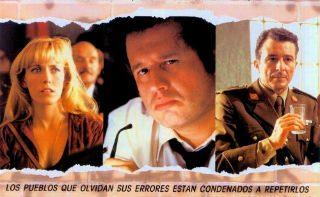"La noche más larga" (The Longest
Night) is a fiction film [...] When we started working on the
script we asked ourselves how we could deal with the year 1975,
seen from the perspective of 1990 which is when we contemplated
making the film. It didn't make sense to us to do a testimonial
film. I thought it was more appropriate to make it from today's
perspective and try to reflect on what happened in those days, how
the characters evolved and why there has been a collective
forgetting about what occurred - something I personally find
worrying [...]

The film doesn't deal with ETA or
the FRAP. It just deals with a time period when people could be
shot by firing squad. It doesn't narrate anybody's life nor is it a
true chronicle about the events.
And yet our story is genuine even
if it didn't happen exactly as we are presenting it. [...] I'm
afraid that trying to reconstruct the 1975 executions by firing
squad would not be meaningful to the new generations who, for
example, don't know what the FRAP was. Because of that, we deal
with the executions of three youngsters instead of five (as
happened in real life) and we don't provide the initials (like ETA
or FRAP) of any particular terrorist group. Everything revolves
around a love story [...]
The film unfolds in three different
time periods: 1975, when we were infinitely misfortunate; one year
later, when it looked like all of us were going to be infinitely
happy, and now, when it seems like we are all dead. The
conversation that takes place in the train between our two
protagonists becomes a sort of metaphor. The fact that two people
who have been so radically different in the past are able to engage
in such a conversation in the present says a lot about the
evolution of certain people.
JOSÉ LUIS GARCÍA SÁNCHEZ